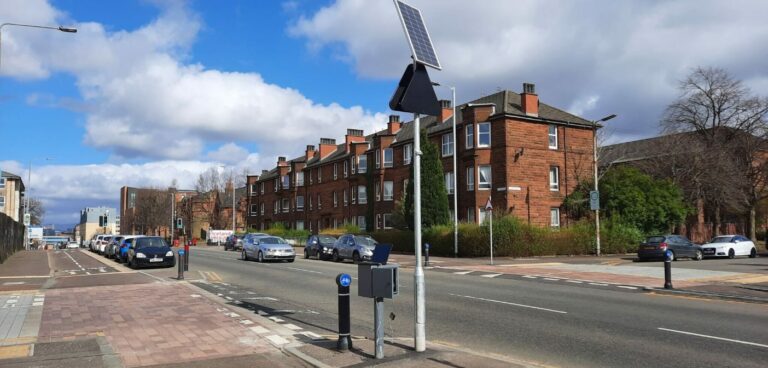Q-Free has announced a four-year agreement with Glasgow City Council to supply and install cycle detection equipment and associated services throughout the Scottish city.
The agreement includes interactive and customised electronic bicycle-activated warning signs that alert drivers to cyclists approaching a junction or travelling in cycleways ahead where visibility of cyclists may be compromised due to street furniture or building lines.
Glasgow City Council will replace its current suite of induction loops-style cycle counters with Q-Free’s HI-TRAC CMU bicycle and pedestrian monitoring system.
Initially, 16 systems, which could feature as many as three signs and accompanying sensors, will be strategically deployed at different sites throughout the city selected based on historical data and the potential to prevent incursions between bikes and other vehicles.
The solution has been developed to provide highly accurate count and detection information, and features unobtrusive, low-voltage controller boxes that can be powered by a single solar panel. The boxes also come fitted to drop-down poles for easy maintenance access.
The system uses in-road piezo-electric sensors 75ft (25m) in both directions from a junction. When the sensors detect a cyclist, they immediately trigger flashing lights on triangular warning signs alerting drivers in all directions to their approach.
Findings from an early installation at a junction with known issues of vehicle/cycle conflicts showed incidences of vehicle/cycle conflict reduced from 17% to 8% while the number of vehicles failing to yield to oncoming cyclists reduced from 35% to 22%.
Christine Francis, head of technical services, Glasgow City Council, said: “A key aim for Glasgow City Council’s strategic cycling plan is to create a vibrant city where cycling is accessible, safe and attractive to all.
“Safety is seen as the main barrier to people cycling more frequently, so improving cyclist safety is a cornerstone of our efforts to promote a shift to more sustainable forms of transportation.”
Glasgow City Council began working with Q-Free in 2016 on an integrated system that gives priority to cyclists at signalised crossings. According to Francis, Glasgow City Council was the first local authority in the UK to install cycle activated electronic signage on the road network.





